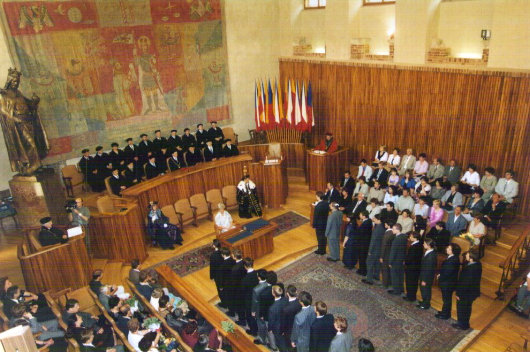
About Andrew Cusack
 Writer, web designer, etc.; born in New York; educated in Argentina, Scotland, and South Africa; now based in London.
Writer, web designer, etc.; born in New York; educated in Argentina, Scotland, and South Africa; now based in London. read more
News
Blogs
Reviews & Periodicals
Arts & Design
World
France
Mitteleuropa
Knickerbockers
Argentina
The Levant
Africa
Cape of Good Hope
Netherlands
Scandinavia
Québec
India
Muscovy
Germany
Academica
Universitas Carolina Pragensis
The Charles University of Prague

Prague’s university, the Universitas Carolina, was founded in 1347 and this is the first university of the Germans — a nation with a long (if varied) intellectual tradition. In a fashion similar to the medieval university of Paris, the Charles University was divided into “nations”: the Bavarians, the Bohemians, the Poles, and the Saxons. The splendid cosmopolitanism of Christendom was threatened by the challenge of nationalism as early as the 1400s, when the Decree of Kuttenberg stoked ethnic tensions by granting the masters of the Bohemian “nation” at the University three votes to the one vote to be shared amongst the Bavarians, Poles, and Saxons. All of this was provoked by various political power plays during the Western Schism, and the Decree resulted in an exodus of German professors and students to other universities, and indeed inspired the foundation of the university at Leipzig. More lamentable was the election, soon after, of the heretic Jan Hus as rector of the Bohemian-dominated university. No good came from this, but after the fall of the Hussites, order was restored.
In the following centuries the university underwent numerous changes. A new academy, the Clementinum, was founded in 1562. The Jesuits were given control in 1622, and twenty years later Ferdinand III merged the two centers of learning to form the Charles-Ferdinand University. In 1784, German replaced Latin as the language of instruction, and in 1791 Leopold II established a chair of Czech language and literature. By the 1860s, the royal city of Prague no longer had a German-speaking majority, and by then Czech had joined German as a medium of learning. Lamentably, the government decided to split Prague’s university in two on lingual lines: the Royal & Imperial German Charles-Ferdinand University, and the Royal & Imperial Czech Charles-Ferdinand University.
The German university experienced a brief heyday just before the First World War, but America’s entry into the conflict spelt doom not only for Catholic Europe as a whole, but specifically for any peoples who found themselves suddenly a member of an “ethnic minority”, no matter if they had dwelled there for centuries. The new Czechoslovak republic passed laws favouring the Czech University over the German University. With just over 50,000 Germans living in Prague after the dissolution of the Austro-Hungarian Empire, the German University considered moving to Reichenberg (Cz., Liberec) in northern Bohemia, the central city to Czechoslovakia’s German population of some millions, but the academic leadership demurred.
After the 1939 invasion and occupation of Czechoslovakia, the Czech University was closed by the Nazis, who purported the close was temporary, but it remained shut until after the Soviet conquest of Prague in May 1945. The new Soviet-backed Czechoslovak authorities began the immediate ethnic cleansing of all Germans from their territory, irrespective of whether they had actively abetted the Nazis, resisted them, or remained inactive. The German University collapsed, but its remnants fled to Munich, where the Collegium Carolina continues today as a German-language institute for higher studies in Bohemian & Czech culture.
While the Czech University reopened — called simply the Univerzita Karlova v Praze, or Charles University of Prague — its freedom was short-lived as the Communists began their takeover of the Czechoslovak government and society. With the relaxation of restrictions during the 1980s, faculty and students began to voice their dissent from the socialist system, and many participated in the Velvet Revolution that ended political communism in Czechoslovakia. Today, the Charles University is widely recognised as the preeminent academic institution of the Czech Republic.
Search
Instagram: @andcusack
Click here for my Instagram photos.Most Recent Posts
- Burns Tower April 19, 2024
- Patrick in Parliament March 18, 2024
- Articles of Note: 13 March 2024 March 13, 2024
- Cambridge March 9, 2024
- Taken on Trust March 4, 2024
Most Recent Comments
Book Wishlist
Monthly Archives
Categories


